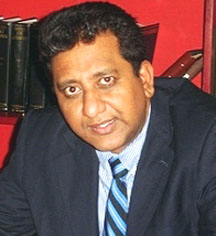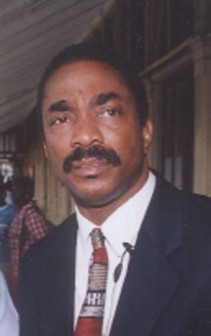Lawyers for the government and the opposition wrangled yesterday over whether the court has jurisdiction to entertain the motion filed by government challenging the decision to limit Home Affairs Minister Clement Rohee’s participation in the National Assembly.
At a hearing before acting Chief Justice Ian Chang, initially scheduled on the motion filed by Attorney General Anil Nandlall, arguments began on a summons filed by Opposition Leader David Granger to have the court dismiss the action.
“…We feel very strongly that the jurisdiction of parliament must not be eroded by these excursions into the court,” attorney Basil Williams, one of the lawyers for Granger, said, even as Nandlall maintained that the challenge to his action was an attempt to stall the matter.
With the filing of the summons earlier this week, Nandlall’s motion has been put on the back burner until its determination. Nandlall’s action, on behalf of the government, had its genesis in a ruling made by Speaker Raphael Trotman, which limits Rohee’s participation in the House, pending the findings of the Committee of Privileges on the enforceability of a motion by Granger seeking to have Rohee gagged in the National Assembly.
Nandlall, who has named Granger and Trotman as the respondents in his motion, is seeking to overturn Trotman’s decision, which he contends is unlawful. In the Affidavit in Support of Summons, Granger had said that he was advised that the declarations and orders being sought “are without merit and are misconceived.” He further said he was advised that the Speaker’s decision was done during the course of his presiding at a sitting of the National Assembly pursuant to the provisions of the Standing Orders and was an internal proceeding of the National Assembly.

At the beginning of the proceedings yesterday, attorney Khemraj Ramjattan, one of Trotman’s lawyers, said that he was unable to file an affidavit in answer to Nandlall’s motion but would be able to do so on Monday. Williams, meanwhile, reported that all that has been done since the last hearing of the matter was to file an application to strike out the motion.
Justice Chang, however, indicated that the filing of the summons did not prevent the filing of an affidavit in answer. After being given a commitment by Williams that same would be filed in a week, Chang give both sides that time period in which to file their affidavits in answer.
Williams then asked for an adjournment but Nandlall quickly objected, stating that the summons was filed “clearly to delay this matter.” He reminded the court that on the last occasion, it made an order which granted seven days leave for the respondents to file their affidavit in answer. He said that to date, this had not been done although more than two weeks had passed.
He further stressed that the matter at hand is of public importance and of great urgency and as such should go ahead.
Chang, however, stated that in light of the summons, more time can be given for the filing of the affidavit in answer.
Nandlall, in response, said that he didn’t need to file anything since this “is a stalling matter.”

Williams did indicate that he was prepared to start his arguments and during submissions that lasted for more than an hour he argued that the court had no jurisdiction to deal with matter as it related to parliamentary business.
He later told this newspaper that the government’s complaint is that the Rohee matter has been sent to the Committee of Privileges. “…All those decisions were matters that were internal to the parliament and as a result it is clear law that the court has no jurisdiction in the internal proceedings of parliament,” he said
“We feel that since the speaker has a discretion when he is presiding to make decisions, his decisions can’t be complained [about] in a court of law,” he further said, adding that the Standing Orders make it clear that the Speaker has to acknowledge a member before that member could speak “and so you are bound by the rules of parliament.”
Williams added that he read extensively from the ruling of the Chief Justice in the very first action filed by Nandlall. “I think this matter by Nandlall is not even citing a constitutional provision that he is relying on, so we feel very strongly that the jurisdiction of parliament must not be eroded by these excursions into the court,” he said, adding that the court must be guarded that it must not usurp the functions of parliament and in so doing affect the doctrine of the separation of powers.
He further said he and his team feel very confident that the court ought not to take jurisdiction in this matter and should rather let parliamentarians in parliament settling resolve it.
In addition, attorney Roysdale Forde, also representing Trotman, addressed the court and argued that it had no authority to deal with parliamentary matters. Forde’s submission was made despite an objection from Nandlall, who said Trotman was not a party to the filing of the summons. However, Forde noted that his client was listed as a respondent on the originating notice of motion and that the summons is weighing on the outcome of that matter.
Nandlall later told reporters that the lawyers for Granger and Trotman have once again raised the objection that the court has no jurisdiction “which is an objection which has been raised in every one of the cases that I have filed concerning the issues arising out of parliament and the court on every occasion before has ruled that the court has jurisdiction to inquire into the proceedings of parliament to determine whether parliament violated the constitution.”
He emphasised his belief that there is an attempt to stall the proceedings and to delay the determination of the case.
The case will continue next Friday, when Forde is expected to conclude his arguments, allowing for Nandlall to start his.





